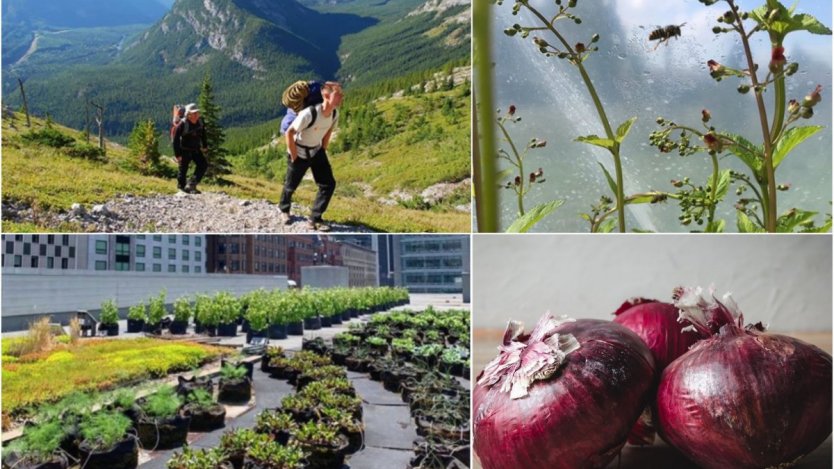Things are slowing returning to what could be remembered as normal, but the move toward normalcy has been hard on some sectors.
In the restaurant industry, employees are facing abuse from customers in response to new COVID-19 protocols and some restaurants have had to make statements urging the public to be respectful of the staff. In Alberta, those who have been spending time outdoors may have noticed an increase in full trash cans. People visiting provincial parks have been disposing food improperly, which has been endangering both wildlife and humans. Across several Western provinces, the uptick in COVID-19 cases among Hutterite colonies has been hard on the communities in more ways than one.
On a more uplifting note, edible forests are popping up all over the country to help the public learn more about food sustainability, and in Montreal, a research project on using recycled glass as sand in grape growing for wine production has enabled a successful rooftop vineyard initiative.
Read more about these news stories, in addition to the new onion recall, below.
Rude customers make reopening restaurants even harder
Restaurants are working hard to adapt to guidelines, regulations and other changes due to COVID-19, but the decline of customers’ manners shouldn’t be one of them. With dining establishments enforcing COVID-19 rules and restrictions, verbal and physical attacks towards employees are on the rise.
A restaurant in Kamloops, Senor Froggy, has noted the increased abuse towards employees, requiring an announcement that customers who are not tolerant of the new protocols may be removed from the restaurant. Another restaurant owner in Kamloops noted that after a server tried to explain that they could not move the tables, a customer threw a plate of food on the ground and assaulted the restaurateur.
The government has since put out a statement telling customers to stay calm during this time, with tips on how to support local restaurants.
Read more about this from Global News.
Edible forests are promoting food sustainability in Canada
When you're taking a walk in a forest, you expect to see things like moss, plants and large trees, but what about rosemary, asparagus, grapes, plums, kiwis and figs? At the Cowichan Green Community Food Forest in Duncan, B.C., you can see just that.
This not-for-profit forest was created by the Cowichan Green Community Society, an environmental group that focuses on food security. Visitors to the forest are welcome to wander at their leisure and fill a basket with anything they find, for free.
Similar concepts are popping up across Canada, from the Northwest Territories to Red Deer, AB. The goal of these edible forests is to not only provide people with fresh food, but also to get them more in touch with nature. In addition to supporting food security for locals, the forests also attract helpful pollinators.
These forests are also being used as a learning tool for students who likely wouldn't learn about picking their local berries from anywhere else. The creators of these forests are hoping that the students will then encourage their parents to plant more bushes or trees, creating a domino effect of sustainable food production.
Find out more about food forests from CBC.
Increased use of Alberta parks leads to increased improper food disposal
With indoor space closures from the pandemic, everyone began rediscovering their local parks and hiking paths. In Alberta though, this did not come without consequences to humans and wildlife. Due to limited facilities around outdoor areas, people have been packing lunches and many have been leaving behind food waste, which has attracted some unwanted customers.
A black bear at Waterton National Park was the most recent fatality due to improper food disposal. Once an animal knows where they can get food, they will often return repeatedly, becoming a risk to the general public.
According to Alberta Parks many bear proof garbage cans are reaching capacity due to increased visitations, and people are leaving their waste on top of, or around, the bins.
It is suggested that you hold onto your garbage until you find a bin with capacity, or to take the garbage home for disposal. If you do find a garbage bin, make sure the door is able to close firmly.
Find out more from Global News.
Montreal produced 100 bottles of wine from rooftop grown grapes
In Montreal, rooftops are being transformed into vineyards through the Vignes en Ville (Vines in the City) project as an offshoot of the research being conducted by Montreal's Urban Agriculture Laboratory.
This project began in 2016, with the aim of studying the efficacy of using recycled crushed glass in the place of sand in soil mixtures for sustainability and the ability of glass to reflect sunlight, which assists in the grapes growing. To date, 545 vines have been planted across four different rooftop vineyards in Quebec located at the at the Palais des Congrès, the Institut de tourisme et d'hôtellerie du Québec, the Ubisoft building and the Centre Agricole in Ahuntsic-Cartierville.
Although the the won't be hitting shelves anytime soon, there is a tasting being planned to allow more people to experience the result of the project.
Find out more about this from CBC.
Hutterite colonies facing stigma for COVID-19 outbreaks
Hutterite colonies have always provided essential food to the homes of Canadians, like eggs, grains, meats and vegetables. So, the recent outbreaks in these tightly knit communities across the Western provinces have been especially hard on them. In addition to the rising number of cases, the stigma surrounding the uptick has been affecting their sales and in turn, their livelihood.
Learn more about this from Global News.
Salmonella outbreak linked to U.S.-grown onions
Health officials have warned Canadians to check their onions for their production location after a recall for onions grown by Thomson International Inc. in Bakersfield, Calif. More than 100 people in Canada, across Alberta, British Columbia, Manitoba, Ontario, Saskatchewan, the Northwest Territories and Yukon, have been sick.
The recalled onions--from brands including El Competidor, Imperial Fresh, Onions 52, Tender Loving Care, Thomson International, Thomson International Premium and Thomson Premium--may have been sold in bulk or in smaller packages online or through various restaurants.
Luckily, onions sold through grocery stores were not impacted by the recall.
Learn more about this outbreak at CTV.













